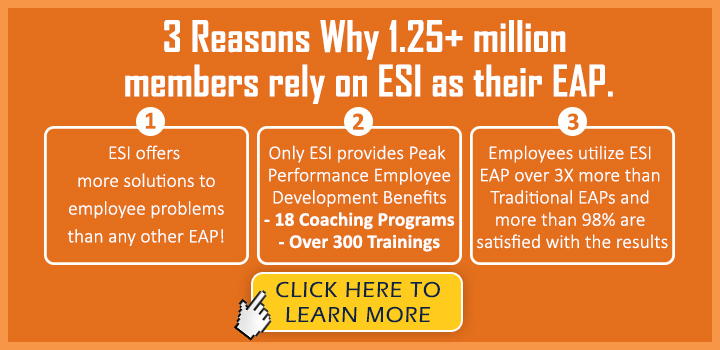It’s vital for HR staff to keep up with changing employment law, We’re offering a roundup of some of the key changes going into 2020, and taking a look at some key issues that may result in legislation over the coming year. And as a warmup, test your compliance savvy with this Employee termination quiz from employment law attorney Robin Shea. (Reminder: ESI EAP offers employers compliance and management training as part of our benefits)
HR Daily Advisor offers a great overview: Are You Prepared for the New Laws Taking Effect January 1, 2020? searchable by map. And here are some of the issues that we’ve been watching.
New overtime rules are in effect as of January 1, 2020.
One of the key employee changes from the Department of Labor should be no surprise: New overtime salary thresholds kick in. Under the new rule, employees would have to earn at least $684 a week ($35,568 a year) to be exempt from overtime pay for any hours worked over 40 in a work week. To learn more about this, see our prior post: Get ready for the new overtime rules on January 1
Paid family leave laws
The states that currently have Paid Family and Medical Leave Insurance Laws laws that require workers or their employers to pay into state paid leave funds through payroll contributions are Connecticut, D.C., Massachusetts, New Jersey, New York, Oregon, Rhode Island and Washington. The National Partnership for Women & Families offer a helpful chart on Paid Family Leave laws that covers the status and effective dates of the law, along with information about which employers are covered and key provisions of the laws. See also this Comparative Chart of Paid Family and Medical Leave Laws in the United States from A Better Balance. Patriot Software talks offers more detail about each state law.
Beyond laws, many employers are voluntarily expanding family leave in an effort to boost retention and employee morale. In The Washington Post article The new paid family leave, Jena McGregor explores how some companies are offering paid time off to care for relatives, train a pet or get acquainted with new grandchildren’
New state and local minimum wage increases
At the start of the year, higher minimum wages kicked in for employees in 22 states and various municipalities. Employment law attorneys Epstein Becker & Green offers a chart of new minimum wage rates that went into effect on January 1, 2020, unless otherwise indicated. (Note:additional state increases are scheduled for later in the year.
Sexual harassment training laws
HR Morning: Sexual harassment training: Does your state have a new law?
Sexual Harassment Training Laws 2020: What’s Changing? – In 2020, employers in Connecticut, Delaware, and Illinois will join Maine and New York in the group of states who require employers to provide sexual harassment prevention training to employees.
Note: As part of our employer services, ESI EAP offers online sexual harassment training that complies with most state laws.
Salary history ban laws
Salary.com: Guide to Salary History Laws by State and Locality – Salary.com explains the law: “What is your current salary?” While this question was a common feature of the interview process, and even expected in years past, it’s now prohibited in many places. An increasing number of state and local governments, such as in Massachusetts, Hawaii, and New York City, have adopted laws that ban employers from requesting salary history information from job applicants. Proponents of these kinds of laws believe that when employers ask prospective employees for their salary history, it perpetuates disparities in pay based on gender and other factors as workers shift from one job to another. Ultimately, the goal of this kind of legislation is to eliminate pay discrimination among women, minorities, and other historically underpaid workers.” See also: Salary History Ban Spreads—New Jersey and New York Jump on Board!
Ban the Box laws
NELP update on Ban The Box Laws – 35 states, the District of Columbia, and over 150 cities and counties have adopted a ban-the-box or fair-chance policies.so that employers consider a job candidate’s qualifications first—without the stigma of a conviction or arrest record by removing the conviction history question from job applications and delaying background checks until later in the hiring process, See also: Jackson Lewis: Ban-The-Box Law Limits Criminal Background Inquiries By Federal Contractors Beginning In December 2021 which includes info and links to state laws.

2020 Leap Year payroll issues
One extra day can create a lot of headaches when it comes to payroll. In 2020, many employers who pay salaried weekly will face 53 payrolls and employers who pay bi-weekly will face 27 rather than the normal 26 pay periods. While this is true of 2020, an extra payroll isn’t exclusive to Leap Years. Sentric HR talks about what an extra pay period means and offers helpful resources to help you determine how to handle it. Employers face choices in how to handle the extra pay. 86% of employers just bite the bullet and pay the extra check – if you choose to do that, make sure that you make your employees aware of this “raise.” Other employers divide all pay periods by 27 or 53. This is more complicated. Although he annual salary is the same, it results in lower pay each pay period, which can be perceived as a negative and deflate morale unless thoroughly explained to staff. Additional resources: The Balance: Payroll Issue: When There Are 27 Pay Periods in a Year – for employees paid bi-weekly and Associated Benefits & Risk Consulting: How will the upcoming leap year impact your payroll?
Marijuana laws
Most states have some level of legalization of marijuana for medical use and a growing number of states have fully legalized the use of marijuana. This interactive map of Marijuana Laws by State in 2020: A Legal Weed Map and Short Guide to Regulation from O.Berk offers updated info. See the Marijuana Policy Project for pending legislation: 2020 Marijuana Policy Reform Legislation and Insurance Journal: Puff, Puff, Passed: 2019 Marijuana Laws in Review and 2020 Projections.
Also see: SHRM: Marijuana and the Workplace: It’s Complicated
Additional Resources:
For all federal laws, go right to the source: Summary of the Major Laws of the Department of Labor
For state laws: State Departments of Labor
Employment Law issues to watch for 2020
- Littler: Shining a Light on Key Issues as we Leap into 2020
- SHRM Blog: Changes to Workplace Law for 2020
- National Law Review: Spoiler Alert! It’s Going to Be a Roaring 2020 With Many Impactful Laws On The Horizon (US)

